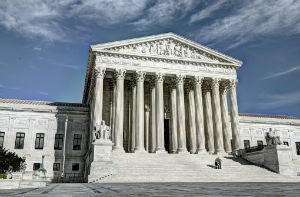The Justices of the United States Supreme Court are hoping that the third time is the charm when it comes to the constitutionality of public union fees. The Court recently added Janus v. American Federation of State, County, and Municipal Employees, Council 31 to its docket for the October 2017 Term.

The specific issue before the Court is whether Abood v. Detroit Board of Education should be overruled and public-sector agency fee arrangements declared unconstitutional under the First Amendment. Last term, the Justices split 4-4 on the same exact question.
Supreme Court’s Prior Review of Abood Decision
In Abood v. Detroit Board of Education, 431 U.S. 209 (1977), the U.S. Supreme Court held that the First Amendment to the U.S. Constitution does not prohibit governments from requiring non-union public employees to pay their “fair share” of dues for collective bargaining, contract administration, and grievance adjustment. The Court made a clear distinction between funds for the expression of political views and funds used to further the union’s duties as collective-bargaining representative. As Justice Stewart’s opinion explained:
We do not hold that a union cannot constitutionally spend funds for the expression of political views, on behalf of political candidates, or toward the advancement of other ideological causes not germane to its duties as collective bargaining representative. Rather, the Constitution requires only that such expenditures be financed from charges, dues, or assessments paid by employees who do not object to advancing those ideas and who are not coerced into doing so against their will by the threat of loss of governmental employment.
In 2014, a slim 5-4 majority held that the First Amendment prohibited the collection of an agency fee from personal care providers because they were not “full-fledged” public employees. The ruling stopped short of extending Abood.
Last term, the Justices were unable to reach a consensus regarding whether union “agency shop” fees violate the First Amendment in Friedrichs v. California Teachers Assn. The case revolved around the First Amendment implications of requiring public employees to “opt-out” of subsidizing a union’s political and ideological activities, rather than requiring public employees sympathetic to the union’s activities to “opt-in.”
Facts of Janus v. AFSCME
Under the Illinois Public Relations Act, a union representing public employees collects dues from its members, but only “fair share” fees (a proportionate share of the costs of collective bargaining and contract administration) from non-member employees for whom the union also negotiates. In 2015, the governor of Illinois filed suit in federal district court to stop the unions’ collecting these fees, arguing that the statute violates the First Amendment by compelling employees who disapprove of the union to contribute money to it. While the district court found that the governor lacked standing, it allowed two Illinois public employees to intervene. Nonetheless, the district court and the U.S. Court of Appeals for the 7th Circuit rejected the claims, concluding that the lower courts did not have the power to overrule Abood.
The Supreme Court will now have that opportunity. While oral arguments have not yet been scheduled, a decision is expected before June 2018. We will continue to cover Janus v. AFSCME on this blog, as well as the Constitutional Law Reporter.
For more information about the case or the legal issues involved, we encourage you to contact a member of Scarinci Hollenbeck’s Government Law Group.
